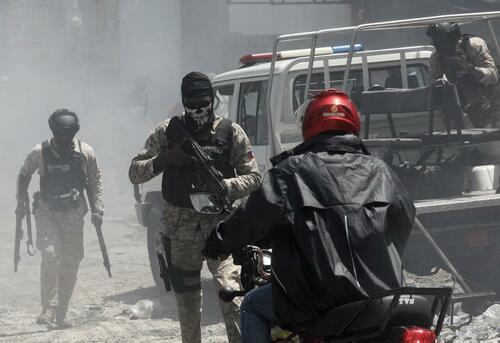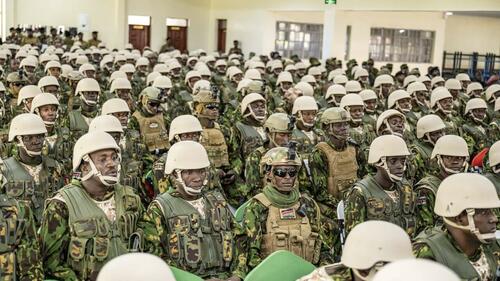A blood-drenched, fiery horror scene played out in Haiti on Thursday, as a rampaging gang killed at least 70 people and injured 16 more. Mowed down by automatic weapons or choked to death by house-arson, the dead included three infants and 10 women, according to the UN's human rights office.
In a troubling indicator of gang violence sprawling beyond the country's capital, the bloodshed took place in the town of Pont-Sondé, which is located in the agricultural Artibonite department, about 60 miles north of Port-au-Prince. The carnage, which commenced around 3 am local time, prompted more than 6,000 to flee the town for their lives.
“Today, once again, once too often, we are faced with the most absolute cowardice,” said Haitian Prime Minister Gary Conille in a social media post. “This heinous crime, perpetrated against defenseless women, men and children, is not only an attack on these victims, but on the entire Haitian nation.”
 In August, Haitian police disperse protestors demanding greater security after gangs attacked their homes and set them on fire (Reuters/Ralph Tedy Erol)
In August, Haitian police disperse protestors demanding greater security after gangs attacked their homes and set them on fire (Reuters/Ralph Tedy Erol)The pattern of gunshot wounds illustrated the pure viciousness of the massacre. As Frantz Alexis, the director of the hospital that received the majority of the casualties, told the Washington Post:
“The patients we admitted had gunshot wounds in almost every part of their bodies. They had been shot in the chest, abdomen, thigh, leg and other areas. … We often receive gunshot wounds in this area, but this is the first time we’ve had such a large number all at once. It’s unprecedented.”
The rampage by the notorious Gran Grif gang targeted property as well, with the perpetrators setting fire to 45 houses and 34 vehicles. The gang's leader, Luckson Elan, claimed responsibility for the murderous mayhem, and said it was an act of retaliation against civilians who refused to prevent police and vigilantes from killing members of the gang, Reuters reports.
Even though Haiti has been suffering through gang violence on a grand scale, the scope of Thursday's attack shocked the sensibilities of the country's citizens. The incident also underscored the impotence of security forces. Speaking for the Dialogue and Reconciliation Commission to Save the Artibonite Valley, Bertide Horace told Reuters that local police refused to leave their station, apparently confident they'd be no match for Gran Grif's firepower. "The gang did not meet any resistance," she said.
 Kenyan police stand in formation before President William Ruto before departing to Haiti. (Presidency of Kenya)
Kenyan police stand in formation before President William Ruto before departing to Haiti. (Presidency of Kenya)In July, Kenyan soldiers deployed to Haiti in a UN-endorsed operation began patrolling Port Au Prince in US-supplied MRAP armored vehicles. They were promptly welcomed with gunfire, and have yet to have any significant impact on the security situation in the impoverished country. Last month, US Secretary of State Antony Blinken visited Haiti, as a senior State official said the White House was considering a plan that would elevate the status of the Kenyans to official UN Peacekeepers.
Last week, the UN Security Council unanimously approved an extension of the multinational security force's mandate, but refrained from the "peacekeeping" escalation. The current outside forces consist of a mere 400 Kenyans and a couple dozen Jamaicans. That's a mere fraction of the 2,500 total police officers pledged by countries like Chad, Bangladesh, Barbados and Benin, AP reports. About 80% of Port au Prince is said to be under firm gang control.
"Washington will likely struggle to gain support for the UN Peacekeeping mission from both the Security Council and Haitians," noted the Libertarian Institute's Kyle Anzalone. "Peacekeepers have a dark legacy in Haiti, including causing a cholera outbreak that killed over ten thousand people and committing rampant acts of sexual violence against women."
Thursday's attack came just days after the neighboring Dominican Republic announced it will start deporting up to 10,000 Haitians a week who are illegally in the country. Sharing the island of Hispaniola with Haiti, the Dominican Republic has forced 67,000 Haitians back into their native hellhole so far this year.
Source link

